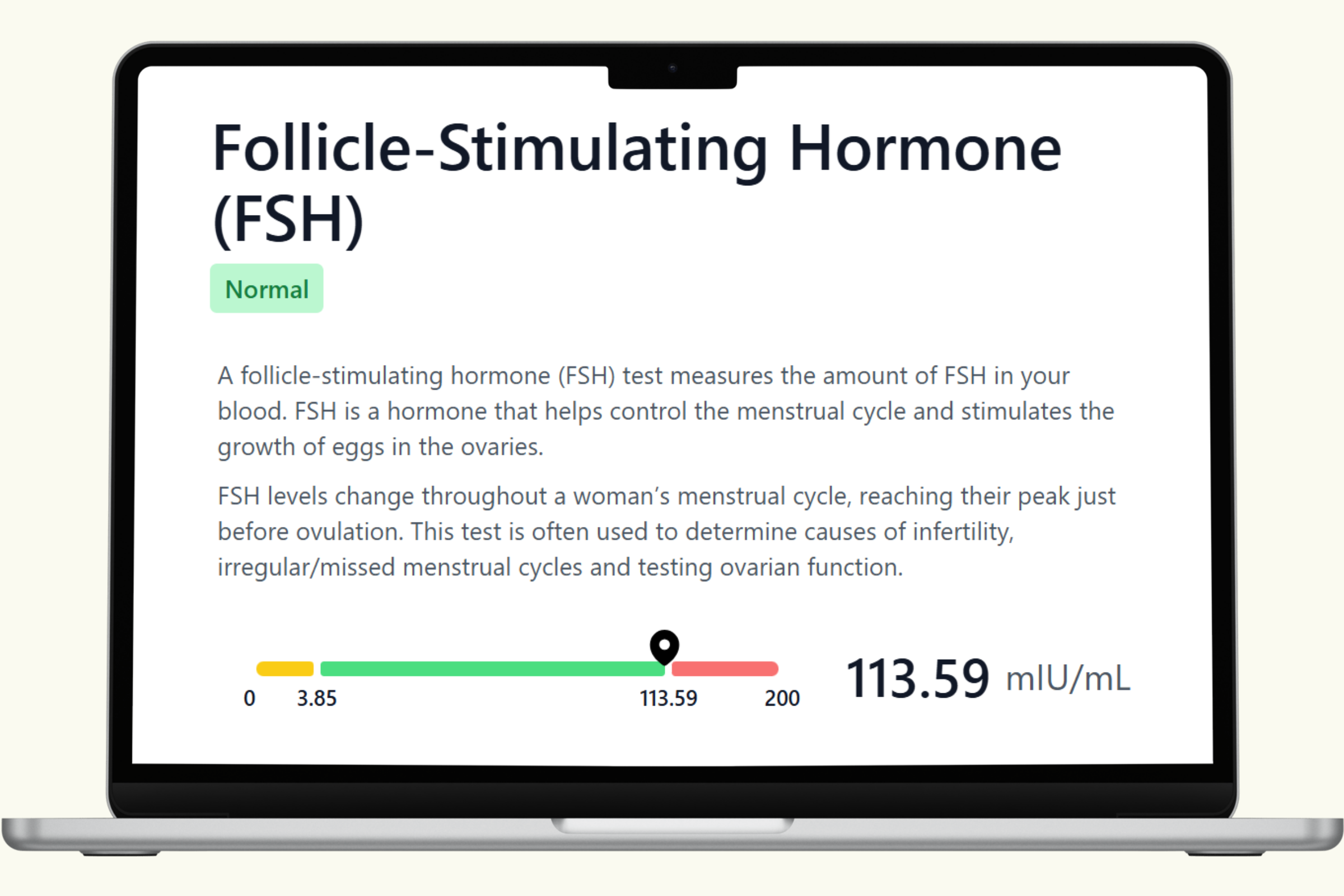Follicle-Stimulating Hormone (FSH) Blood Test: A Window Into Reproductive Health
The Follicle-Stimulating Hormone (FSH) Blood Test, included in the PlexusDx Women’s Hormone Blood Test, measures FSH levels to provide insight into ovarian function, fertility, and menstrual health. Produced by the pituitary gland, FSH is a critical hormone for reproductive balance, stimulating the growth and maturation of ovarian follicles that release eggs during ovulation. Because FSH levels fluctuate naturally throughout the menstrual cycle, testing can reveal valuable information about fertility status, cycle irregularities, and the transition into menopause.
What is FSH?
FSH is one of the two key pituitary hormones that regulate ovarian function, alongside luteinizing hormone (LH). In women, FSH supports reproductive processes in several important ways:
- Egg Development: FSH stimulates the ovaries to develop follicles, each containing an immature egg, during the follicular phase of the cycle.
- Estrogen Production: Growing follicles release estradiol, which helps thicken the uterine lining in preparation for a potential pregnancy.
- Cycle Regulation: Rising estradiol levels signal the pituitary to reduce FSH, preventing overstimulation and ensuring only one dominant egg matures.
- Ovulation Triggering: When FSH and LH work in tandem, they orchestrate ovulation—the release of the egg into the fallopian tube.
Why Test FSH?
Doctors may recommend FSH testing for several reasons:
- Infertility Evaluation: FSH testing helps determine whether ovulation is occurring normally and whether the ovaries are responding as expected.
- Menstrual Irregularities: High or low FSH levels can point to the causes of irregular or absent periods.
- Ovarian Reserve Assessment: Elevated FSH, particularly on day 3 of the cycle, may indicate diminished ovarian reserve and reduced fertility potential.
- Menopause or Perimenopause: Rising FSH is a hallmark of declining ovarian function and the transition to menopause.
- Pituitary Disorders: Abnormal FSH levels may also signal issues in the pituitary gland itself.
Reference Ranges for FSH
FSH levels are reported in international units per liter (IU/L) and vary according to age, menstrual cycle phase, and menopausal status. Here are commonly used reference ranges:
- Follicular Phase: 3.5 – 12.5 IU/L
- Mid-Cycle Peak (Ovulation): 4.7 – 21.5 IU/L
- Luteal Phase: 1.7 – 7.7 IU/L
- Postmenopause: 25.8 – 134.8 IU/L
Functional Ranges for Optimal Fertility
Functional medicine practitioners often apply narrower “optimal” ranges, especially for fertility assessment:
- Day 3 of Menstrual Cycle: 3 – 9 IU/L (optimal ovarian reserve)
- Elevated Day 3 FSH (>10 IU/L): May suggest reduced ovarian reserve
- Very High Levels (>20 IU/L): Often associated with menopause
Symptoms of Abnormal FSH Levels
- Low FSH: May be linked to absent or irregular periods, poor egg development, or pituitary dysfunction. Symptoms can include infertility, low estrogen, and lack of ovulation.
- High FSH: May signal diminished ovarian reserve, menopause, or primary ovarian insufficiency. Symptoms can include hot flashes, night sweats, mood swings, and infertility.
How the PlexusDx FSH Blood Test Works
The PlexusDx Women’s Hormone Blood Test uses an at-home dried blood spot method with an ADX card, offering a convenient and reliable way to measure FSH levels:
- Collect a few drops of blood using a quick finger prick.
- Apply the blood to the ADX collection card.
- Mail your sample back using the included pre-paid envelope.
Certified laboratories process your sample, and you receive fast, accurate results—without needing to schedule an in-office blood draw.
How to Interpret Results
FSH results should always be interpreted in context with menstrual cycle phase, age, symptoms, and other hormone levels (such as LH, estradiol, and progesterone). For example, high FSH levels during the early follicular phase may suggest diminished ovarian reserve, while very low levels may point to pituitary suppression or hypothalamic dysfunction.
Supporting Healthy FSH Balance
- Nutrition: A balanced diet with adequate protein, omega-3s, and micronutrients like zinc and vitamin D supports hormone function.
- Stress Reduction: Chronic stress can disrupt the hypothalamic-pituitary-ovarian axis, altering FSH release.
- Healthy Weight: Both low body fat and obesity can negatively affect FSH levels and ovulation.
- Medical Support: Depending on results, your healthcare provider may recommend fertility treatments, hormone therapy, or lifestyle modifications to optimize ovarian health.
Key Takeaways
- The FSH Blood Test measures follicle-stimulating hormone, a key regulator of egg growth, ovulation, and reproductive health.
- FSH levels vary by cycle phase and rise naturally after menopause.
- Doctors use FSH testing to evaluate infertility, irregular cycles, ovarian reserve, and the menopausal transition.
- The PlexusDx Women’s Hormone Blood Test uses at-home dried blood spot collection for convenient, accurate results.
- Understanding FSH levels empowers women to take control of fertility planning, cycle health, and long-term reproductive wellness.
By testing FSH with PlexusDx, you gain a deeper understanding of your reproductive system and hormone balance, helping you make informed decisions about fertility, menstrual health, and menopause.

Share:
Luteinizing Hormone (LH) Blood Test
Testosterone (Female) Blood Test